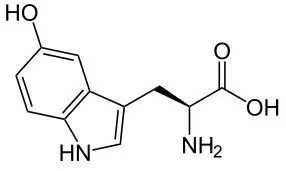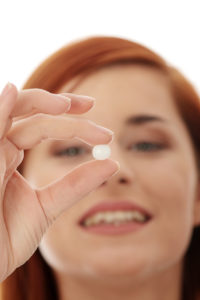Table of Contents
5-HTP (5-Hydroxytryptophan or oxitriptan) is an amino acid that is naturally produced in your body. 5-HTP is synthesized from the amino acid tryptophan which we get from food.
5-HTP is the immediate precursor of serotonin. And as a nootropic and dietary supplement, 5-HTP is popular with those who advocate its effectiveness in treating depression. Along with a number of other serotonin-related diseases.
But using 5-HTP for treating depression and anxiety is not supported by science. The research is contrary to how 5-HTP is viewed by many, including medical doctors.
When we dig into the research, we find that 5-HTP may be contraindicated for depression in those whom marketers advocate its use.[i]
We’re all for boosting neurotransmitter levels and optimizing cognitive performance here at Nootropics Expert®. But now and again I run into a nootropic or dietary supplement that may be popular. But also may be a particularly bad idea.
We’re going to get to the bottom of how 5-HTP works in your brain in this review. We’ll examine why it’s critical for brain health. And reasons why you may want to find another way to boost serotonin levels in your brain.
5-HTP helps:
- Anxiety & Depression. 5-HTP is synthesized into serotonin in brain cells. Elevating levels of serotonin can help relieve the symptoms of anxiety and depression.
- Neurotransmitters. 5-HTP is a necessary ingredient for serotonin synthesis which boosts mood and social behavior, improves memory, regulates appetite and digestion, sleep, sexual desire and function.
- Brain Optimization. A critical balance of the primary neurotransmitters serotonin and dopamine are needed for the highly optimized brain. When these neurotransmitters are not in balance it affects mood, memory, cognition, decision-making, sexual desire, and a host of other critical life functions.
What is 5-HTP?
5-HTP (5-Hydroxytryptophan or oxitriptan) is an amino acid that’s synthesized from the essential amino acid tryptophan.

Tryptophan is hydroxylated by tryptophan hydroxylase to 5-HTP (5-hydroxytryptophan), then decarboxylated to serotonin (5-hydroxytryptamine or 5-HT).[ii]
Tryptophan → 5-HTP → serotonin
80-90% of your body’s serotonin is made in your intestines. But serotonin cannot cross the blood-brain barrier. So all the serotonin that your brain needs has to be made within the brain. This is where 5-HTP comes in…
5-HTP crosses the blood-brain barrier more readily than tryptophan. And gets synthesized into serotonin at a faster rate than from tryptophan.[iii]
As a neurotransmitter, serotonin influences directly and indirectly, the majority of brain cells. So if you want to boost serotonin in your brain, some find that supplementing with 5-HTP is better than taking tryptophan.
Tryptophan, which your body uses to make 5-HTP, can be found in turkey, chicken, milk, potatoes, pumpkin, sunflower seeds, turnip and collard greens, and seaweed.
5-HTP as a nootropic supplement is a naturally occurring amino acid derived from seed pods of Griffonia simplicifolia, found in West and Central Africa. 5-HTP content in extracts of this plant vary from 2 – 20.83% (from seeds obtained in Ghana).[iv]
How does 5-HTP work in the Brain?
5-HTP is a precursor to serotonin. The neurotransmitter serotonin plays a role in sleep, appetite, learning & memory, mood, and sexual function.
When tryptophan’s role in converting to 5-HTP for boosting serotonin doesn’t work efficiently, the result is often depression, chronic headache and insomnia.
An open-label trial was conducted in Italy to determine the efficacy of using 5-HTP in young subjects with high levels of “romantic stress”.
Serotonin has been linked to human romantic attachment. So researchers in this study set out to determine brain levels of Brain-Derived Neurotrophic Factor (BDNF) and serotonin in relation to changes in romantic stress during the study.
15 healthy subjects (mean age 23.3 years) who had a “romantic breakup” took part in the study. Participants received 60 mg of Griffonia simplicifolia extract containing 12.8 mg 5-HTP daily for 6 weeks.
The subjects were evaluated for BDNF and serotonin levels at the beginning of the study, at 3 weeks and then again at the end of the 6-week trial.
The scientists observed significant improvements in romantic stress scores from weeks 0 through 3. So far, 5-HTP seems to be working. But no further improvement was seen from weeks 3 through 6. Even though the young people had significantly higher levels of BDNF and serotonin.[v]
More Involved in Depression and Stress than Serotonin
This “romantic breakup” study is a classic illustration of why using 5-HTP alone to treat depression and stress may not work. And if it does work, why it may not work for long.
Depression is often more than simple serotonin dysfunction. Depression can also be associated with catecholamine dysfunction, including dopamine and/or norepinephrine. Or a combination of serotonin and catecholamine dysfunction.
When you take 5-HTP alone, you are also depleting dopamine, norepinephrine, and epinephrine. Synthesis of serotonin from 5-HTP, and dopamine from L-DOPA is catalyzed by the same enzyme, L-aromatic amino acid decarboxylase (AAAD).
Dopamine and serotonin precursor supplementation must be taken in proper balance. Because when you use only 5-HTP, it dominates dopamine at the AAAD enzyme synthesis level.
Blocking dopamine synthesis at the AAAD enzyme through competitive inhibition will lead to depletion of dopamine and the rest of the catecholamines.[vi]
Going back to our Italian study of young people dealing with “romantic stress”, the subjects stopped responding to 5-HTP in the 2nd half of the study. Likely because their catecholamines became depleted through continuous 5-HTP supplementation.
Studies have found that when dopamine is depleted enough, 5-HTP will no longer function.[vii]
Catecholamine Dysfunction Affects More Than Just Depression
When catecholamine neurotransmitter levels (dopamine and/or norepinephrine) influence depression, supplementing with 5-HTP alone is not the way to go. Because you may deplete dopamine and norepinephrine, worsening the disease and its underlying cause.
But this contraindication is not exclusive to depression. It extends to all other diseases where catecholamine dysfunction has been implicated. Including ADHD[viii], obesity, anxiety, seasonal affective disorder (SAD), and Parkinson’s Disease.[ix]
How things go bad
 Amino acid precursors of serotonin (i.e. 5-HTP) and dopamine (i.e. L-Tyrosine) work together during synthesis, metabolism and transport to the point that they function as one system.
Amino acid precursors of serotonin (i.e. 5-HTP) and dopamine (i.e. L-Tyrosine) work together during synthesis, metabolism and transport to the point that they function as one system.
When serotonin and dopamine are properly balanced, functions that are regulated only by serotonin, can be regulated by manipulating dopamine levels. And functions regulated only by dopamine in this balanced state can be regulated by manipulating serotonin.[x]
When you mess with this balance and improperly supplement with serotonin or dopamine precursors, you don’t get the desired effect of using that nootropic. And you increase the possibility of side effects with too much serotonin.
If you supplement with only one precursor (i.e. 5-HTP to boost serotonin) that dominates the other system (i.e. dopamine synthesis), depletion of the dominated system will occur (i.e. depleted dopamine).
And if this effect is pronounced enough, you will not get the benefit you were aiming for when supplementing with the original precursor (i.e. 5-HTP).
A powerful example of this effect is in the management of Parkinson’s Disease where the effects of L-DOPA are no longer observed over time due to serotonin depletion.[xi]
Since serotonin and dopamine cannot cross the blood-brain barrier, the number of serotonin and dopamine molecules in the brain is a function of the amount of nutrients (amino acid precursors) that are available to be synthesized into new neurotransmitter molecules.
Optimizing brain function with minimal side effects is NOT a function of supplementing until you get sufficiently high amino acid levels. It’s a function of achieving the proper balance between serotonin and dopamine.
5-HTP benefits
5-HTP is absolutely critical for synthesis of serotonin in your brain. But supplementing with 5-HTP to boost serotonin does not work well.
Using 5-HTP to treat depression has had very little success over the last few decades of clinical trials and biohacking.
Integrating 5-HTP into your nootropic stack is much more complicated than simply adding some 5-HTP in order to boost serotonin.
5-HTP alone will not work for depression, or any other issue you’re dealing with involving the catecholamines (dopamine, norepinephrine, epinephrine) because of 5-HTP’s tendency to deplete those neurotransmitters.
5-HTP will boost serotonin in your brain.[xii] But 5-HTP must be carefully stacked with precursors for dopamine and norepinephrine or you risk making the situation worse.
You must avoid supplementing with only one of the serotonin or dopamine amino acid precursors. When amino acid precursors are not in balance, you end up with decreased effectiveness of that nootropic, increased side effects, and depletion of the non-dominant system.
How does 5-HTP feel?
Reactions to supplementing with 5-HTP vary considerably but the one consistent theme is initial feelings of well-being, better sleep, less need for sleep, improved mood, less social anxiety, lower appetite, improved tolerance for stress and improved cognitive function.
And after a couple of weeks of dosing 5-HTP – side effects begin. Serotonin overload results in dopamine and norepinephrine depletion.
Side effects include feelings of lethargy, depression, brain fog, stomach pain, and possibly a chronic tension type of headache. Worst case scenario is nausea, vomiting and even blacking out.
Neurohackers who report consistent success supplementing with 5-HTP stack it with B-Vitamins, a dopamine precursor like L-Tyrosine, and only use 5-HTP as needed.
Those who have a bad experience with 5-HTP from the start often have no idea why they’ve reacted badly. But an educated guess is their depression was catecholamine (dopamine, norepinephrine, epinephrine)-related. And boosting serotonin made their dopamine-related issues worse. Very quickly.
One huge word of WARNING: Do NOT take 5-HTP with any antidepressant medication. You put yourself in the very real danger of Serotonin Syndrome which can ultimately kill you.
5-HTP Clinical Research
5-HTP supplements are heavily marketed as a natural remedy for depression. But the science does not support using 5-HTP for depression. We have decades of clinical trials available. And there is no evidence of the efficacy in using 5-HTP for depression.
5-HTP instead of selective serotonin reuptake inhibitors
The Department of Public Health at the University of Queensland Medical School in Australia did a systematic review of literature dating from 1966 – 2000 for “5-HTP” and “depression”.
The researchers found 108 clinical studies of which only 2 studies, one with serotonin (5-HT) and one with L-Tryptophan for a total of 64 patients met sufficient quality criteria to be included. These studies suggest serotonin (5-HT) and L-Tryptophan are better than placebo at alleviating depression.
But the researchers noted “the small size of the studies, and the large number of inadmissible, poorly executed studies, cast doubt on the results from potential publication bias, and suggests that they are insufficiently evaluated to assess their effectiveness.”[xiii]
5-HTP for Fibromyalgia
A double blind controlled study in Italy studied the efficacy of using 5-HTP in treating fibromyalgia symptoms.
50 patients with primary fibromyalgia syndrome were selected for this study. This 1990 study did not publish the amount of 5-HTP used. But the researchers found a significant improvement in fibromyalgia symptoms with only mild and transient side effects.[xiv]
5-HTP for Treatment of Depression
Insufficient activity of the neurotransmitters serotonin and norepinephrine is a central element of the model of depression most widely held by neurobiologists today.
In the late 1970’s and 1980’s, numerous studies were performed in which depressed patients were treated with the serotonin precursors L-Tryptophan and 5-Hydroxytryptophan (5-HTP), and the dopamine and norepinephrine precursors Tyrosine and L-Phenylalanine.
A summary published in the Alternative Medicine Revue looked at the data from all these studies. The author noted that the nature of the studies makes it difficult to draw firm conclusions regarding the efficacy of neurotransmitter precursors for treating depression.
While there is evidence that precursor loading could work, particularly for serotonin precursor 5-HTP, more studies of suitable design and size “might lead to more conclusive results”.[xv]
Those studies have not materialized since that report was published 22 years ago.
5-HTP Recommended Dosage
Recommended dosage of 5-HTP if you’re going to try it is 50 mg 1 – 3 times per day.
Some studies have used higher doses than the recommended dose, but 5-HTP can be toxic for your central nervous system at high doses.
For anxiety or depression, 5-HTP is dosed at 150 – 300 mg per day total.
To relieve post MDMA (Ecstasy) depression, 5-HTP 100 mg on Day 3-7 after MDMA use.[xvi]
Successfully supplementing with 5-HTP requires stacking it with a dopamine precursor like L-Tyrosine or L-DOPA along with B-Vitamins (for synthesis), and one of the sulfur-containing amino acids (methionine, cysteine, homocysteine, or taurine).
And you must monitor the effects this stack is having on your body. If you start experiencing side effects of any kind, it’s a good indication that either serotonin or dopamine is out of balance.
DO NOT combine 5-HTP with any kind of antidepressant medication.
Combining SSRI’s, Tricyclics or MAOI’s with 5-HTP will cause Serotonin Syndrome. An extremely dangerous condition involving severe mental changes, hot flashes, rapidly fluctuating blood pressure and heart rate, and possibly coma leading to death.
Serotonin Syndrome can kill you. And I’m not kidding here.
5-HTP Side Effects
5-HTP supplementation can cause heartburn, heart palpitations, headache, stomach pain, nausea, vomiting, diarrhea, drowsiness, sexual problems and muscle issues.
5-HTP can also cause some pretty radical mood changes including agitation, aggressiveness, anxiety, euphoria, poor decision-making, irritability, psychosis, restlessness and insomnia.
5-HTP can make the symptoms of schizophrenia, bipolar disorder and other mental disorders worse.
Serotonin Syndrome
And I can’t emphasize this enough so I’m going to repeat it here in case you missed it…
DO NOT combine 5-HTP with any kind of antidepressant medication. Or with carbidopa.
Combining SSRI’s, Tricyclics or MAOI’s with 5-HTP will cause Serotonin Syndrome. An extremely dangerous condition involving severe mental changes, hot flashes, rapidly fluctuating blood pressure and heart rate, and possibly coma.
And combining 5-HTP with carbidopa also has the potential of causing Serotonin Syndrome.
Serotonin Syndrome can kill you. And I’m not kidding here.
Type of 5-HTP to Buy
5-HTP is made from tryptophan in your body.
5-HTP as a nootropic supplement is made from extracts of the African tree Griffonia simplicifolia. 5-HTP supplements are typically in tablet or capsule form.
You’ll often find 5-HTP in many ready-made vitamin and herbal formulas.
Nootropics Expert Recommendation
5-HTP 50 mg up to 3-times per day
 I DO NOT recommend using 5-HTP as a nootropic supplement.
I DO NOT recommend using 5-HTP as a nootropic supplement.
Your body does synthesize 5-HTP on its own to make serotonin in your brain. And you can’t get 5-HTP from food. But you can get L-Tryptophan from food which is synthesized into 5-HTP in your body.
5-HTP may help you if you’re dealing with depression. But you must stack if with a dopamine amino acid precursor along with B-Vitamins and a sulfur-containing amino acid. See the “5-HTP Recommended Dosage” in this review above.
IF you are going to try 5-HTP, I suggest starting with a dose of more than 50 mg daily. You may want to take it in the evening because it could help sleep disorders.
Short-term dosing of 5-HTP of no more than 2 weeks seems to provide the most benefit if you’re going to benefit from this nootropic.
Or try using 5-HTP only on an “as needed” basis. For a mood boost, reduce social anxiety, and provide a short-term boost in cognition.
5-HTP supplementation on its own is NOT recommended. Nor is it recommended for long-term use.











Join The Discussion - 359 comments
Kyle
February 7, 2022
Hi, was wondering if this would lead to serotonin syndrome if combined with an MAO A inhibitor such as quercetin? Even if only used on an as needed basis as suggested?
I’m newer to using nootropics and notice alot seem to have MAOI characteristics. Would any Other combos such as Ashwagandha, Gingko Biloba, or Rhodiola Rosea with 5-HTP also have negative or possibly fatal effects?
Can it be combined with NALT?
David Tomen
February 7, 2022
Kyle the concern is using something like 5-HTP with prescription SSRIs or MAOIs. Used with natural nootropics is not an issue.
Vadim
January 9, 2022
Hello! You have a great site!
According to my genes, I have a bad conversion from tryptophan to 5 5 НТРs, and according to the tests, the level of tryptophan is one third higher than normal, so I think it would be better for me to use 5 НТРs.
But for some unknown reason, the use only leads to irritability. 50 mg light 300 mg strong. I also took a break and drank tyrosine before 5 НТРs, but this did not affect the result.
By the way, earlier I tried tryptophan and for the first 2 days it gave a slight subtle sedation, and then in a milder form, irritation.
A similar situation is with melatonin, at first light sedation, and then, on the contrary, irritation.
To put it mildly, I am at a loss as to my reaction to these supplements. It looks as if something is wrong in the serotonin system.
I would be grateful if you can help me understand why this is happening. Do you have any ideas?
David Tomen
January 9, 2022
Vadim, scroll up and read the entire section called “Side Effects” above. Please do not take this the wrong way. But you could be dealing with an undiagnosed mental disorder.
That type of adverse reaction is usually due to using too much of a supplement like 5-HTP. But in your case there is something else going on. And it’s not ‘how much’ you are using. It is the way your system is reacting to its use.
Crystal
December 18, 2021
Greetings! I recently started taking 5-HTP, just 50mg before bed. How many mg of L-Tyrosine would I need to take to balance it out? Am I taking too little of the 5-HTP? I notice the L-Tyrosine pills seem to only come in 500-1000mg doses.
Thanks in advance!
David Tomen
December 20, 2021
Crystal, if all you are using is 50 mg 5-HTP you do not need to worry about upsetting your serotonin/dopamine balance. It’s when you use much higher doses of 5-HTP that you need to consider raising dopamine to keep up with more serotonin.
ALPHA
December 15, 2021
Good evening, David. When dopamine is depleted because of 5htp, do you stop it, the symptoms stop and dopamine levels return to normal.
David Tomen
December 16, 2021
That is the idea. But you can avoid this by using L-Tyrosine during the day to keep your dopamine levels up while using 5-HTP.
Kevin McCormick
December 15, 2021
Hi Why not combine 5-HTP with a dopamine boosting supplement?
David Tomen
December 16, 2021
Kevin, depending on my much 5-HTP you use you must use L-Tyrosine during the day to increase dopamine because serotonin and dopamine need to be in balance.
Marília
December 10, 2021
Hi David. I love your website. Thank you!
I’m gonna tell you my story with 5HTP. Maybe you can help me…
(Sorry my english, I’m from Brazil). I’ve been taken 150mg of 5HTP 2 times a day for 9 months, and my experience (mainly in the last few months) was terrible!! My gynecologist/nutrologist indicated because my serotonin was too low. All of my blood tests and vitamins are great, I sleep well, I do workouts 4x weakly and have a healthy diet. And I was always sooo lethargic, desmotivated, with no concentration, even to speak and organize my ideias was hard. I didnt understand why all of this was happening. I became desperate and in the last month, everyday at the night I’ve cryied because of mine useless day. It was such sad moments, I wasn’t recognizing me. After a lot of research, I’ve stopped with 5htp and started taking 500mg of tyrosine 2x a day. Result: my life and my mind had 100% CHANGED. I knew they were there. They come Back! And this was SO CRAZY! I went to a neurologist who approves me to continue with tyrosine and asked for some exams (wich I didnt get yet).
The first week was perfect, but now I’m starting to get lazy and desmotivated again. Oh no! 🙁 Do you Think it’s because I cut the 5HTP? I really dont want to take them again…
The triptophan its ok to take in a long term?? What should I do?Thank you!!
David Tomen
December 10, 2021
Marília, your positive experience with L-Tyrosine is no surprise. But dopamine and serotonin must be in balance. So, I suggest using L-Tyrosine as you are during the day and then use 500 mg L-Tryptophan before bed. That should help balance things.
But remember there is never a “one pill” solution when fixing these things. It may still take more experimenting with other nootropics. But this should get you started.
Marília
December 11, 2021
Thank you! I’m so happy with your fast answer (I think your experience can help me more with this).
Well, I’ve tried taking others, but I haven’t had as much success as with tyrosine. I’ll keep trying with caution and until I find a good doctor. My last doubt is: would I have to take this two everyday for the long term, or do I need to take a break sometimes?
David Tomen
December 11, 2021
Marilla, it is my experience that once you find a supplement that works for you then keep on using it. Think of this a ‘food’ because we are supplementing what our body and brain need that we cannot get from food. And unless you are fasting you would not go without food for a day. Would you? 🙂
Marília
December 11, 2021
Ok, right. Thank you again!
Andrew Richardson
December 8, 2021
Would taking 5HTP 50MG or 100MG like maybe once a week be a bad thing? can I take it with L-theanine and NAC and OMEGA and Vit D
I read it can help insomnia
David Tomen
December 9, 2021
Andrew, that low dose of 5-HTP used once per week is not a “bad thing” but not sure why you would even use it once per week.
Low dose L-Theanine, regular doses of NAC, OMega-3s and Vitamin D should all be used early in the day. Because DHA and Vitamin D can have stimulatory effects. Which is contrary to sleep.
For sleep you need 0.5 – 0.8 mg melatonin which is made from serotonin. You can safely use L-Tryptophan every day and long-term and it should continue to work. But that is not so with 5-HTP.
Steve Brookes
June 15, 2022
Hi Andrew
Is the following stack safe:-
5 HTP 100mg per day
L theanine 300mg per day
L tyrosine 400 mg per day
Ginkgo Biloba 250 mg per day
Kind Regards
David Tomen
June 15, 2022
I would divide the L-Theanine into 3 – 100 mg doses because 300 mg can make you sleepy.
And L-Tyrosine dosed twice per day – morning and noon.
Adele
November 7, 2021
Hi there!! I just bought some melatonin with 5-htp in it because I have “med resistant depression” and adhd, so sleep is an issue. Is there any benefit to keeping dopamine and serotonin in balance if I take adderall for adhd?
David Tomen
November 8, 2021
Adele, dopamine and serotonin must be in balance. Because it they are not you’ll experience symptoms of either excess dopamine or serotonin.
The best way to support Adderall use is with the protocol I describe in this article: https://nootropicsexpert.com/best-nootropics-for-adhd-add/